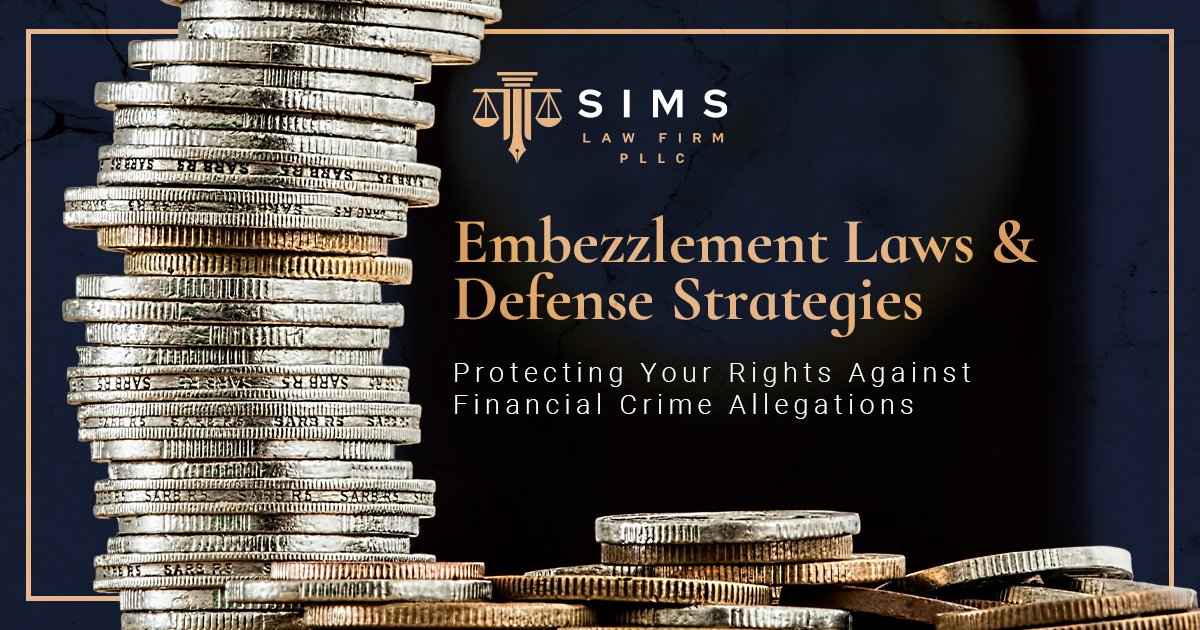Embezzlement is a serious offense in Mississippi, carrying significant penalties upon conviction. At The Sims Law Firm, we understand the complex and damaging nature of these charges. With over 20 years of experience, our team is well-equipped to navigate the intricacies of embezzlement cases, ensuring our clients receive the most effective defense possible.
What is Embezzlement?
Embezzlement in Mississippi involves the misuse or fraudulent transfer of assets by someone in a position of trust, such as an employee, volunteer, or caretaker. Unlike theft, embezzlement typically involves assets legally entrusted to the defendant by virtue of their position or relationship within an organization, family, or business. According to the Mississippi Code Title 97, Chapter 23, Section 97-23-19, the law categorizes embezzlement based on the asset’s value, impacting the severity of the charges and potential sentencing. This statute provides the foundation for prosecuting embezzlement, distinguishing between misdemeanor and felony charges depending on the asset’s worth.
For further understanding of related Mississippi laws, explore Mississippi Code Title 97, Chapter 11, Section 97-11-31, which covers additional legal contexts for embezzlement.
Common Examples of Embezzlement
Embezzlement can take on various forms. Some common examples include:
- Family Members: A relative entrusted with managing another family member’s finances who uses the funds for personal benefit.
- Organizational Treasurers: A treasurer of a non-profit or community organization who transfers funds from the organization’s account for personal expenses.
- Employees: A retail store employee who, for their own gain, misappropriates products or funds entrusted to them by their employer.
In each scenario, the defendant misuses their position of trust, leading to severe legal consequences if proven guilty.
Penalties for Embezzlement in Mississippi
The punishment for embezzlement in Mississippi varies with the value of the assets involved:
- Less than $1,000: Classified as a misdemeanor, punishable by up to 6 months in county jail and fines up to $1,000.
- $1,000 to $5,000: Classified as a felony, punishable by up to 5 years in prison and fines up to $5,000.
- $5,000 to $25,000: Felony, with potential prison time up to 10 years and fines up to $25,000.
- Over $25,000: Felony, punishable by up to 20 years in prison and fines up to $25,000.
These classifications, detailed in Mississippi Code § 97-23-19, underscore Mississippi’s strict stance on embezzlement, where harsher penalties are imposed as the asset value increases. This makes knowledgeable legal defense essential to navigating potential prosecution and sentencing outcomes.
Defense Strategies for Embezzlement Charges
At The Sims Law Firm, we use a range of strategies tailored to the unique circumstances of each embezzlement case. Potential defenses may include:
- Lack of Intent: Establishing that the defendant did not intend to misappropriate funds can significantly impact the outcome.
- Entrapment: If the defendant was coerced into actions they wouldn’t normally commit, entrapment can be a viable defense.
- Mistaken Ownership: If the defendant reasonably believed they had a legal right to the property, this can weaken the prosecution’s case.
- Insufficient Evidence: Challenging the evidence’s validity is fundamental in any criminal defense, especially in embezzlement cases where documentation and intent are critical.
Every defense strategy is customized based on the allegations and evidence to achieve the best possible result.
Frequently Asked Questions (FAQs)
How is embezzlement proven?
To prove embezzlement, the prosecution must demonstrate:
- The defendant was in a position of trust or had lawful access to the property.
- The property was used or transferred for personal gain or outside its intended purpose.
- The defendant had fraudulent intent to convert the property to personal use.
These elements must be substantiated with credible evidence to secure a conviction.
What does it mean to be convicted of embezzling?
A conviction for embezzlement can lead to a criminal record, fines, and imprisonment, with severity depending on the embezzled amount. Convictions also impact future employment, financial stability, and personal reputation. Under current law, an embezzlement conviction cannot be expunged (removed from a criminal record). Legal representation is crucial to potentially mitigate or avoid these consequences.
What is the Mississippi Code for embezzlement?
The Mississippi Code Title 97, Chapter 23, Section 97-23-19 outlines the legal definitions and penalties for embezzlement, specifying the classifications and sentencing guidelines based on the value of the embezzled property.
What is the most common form of embezzlement?
The most frequent type of embezzlement involves employee theft, often in roles that provide access to funds or products. This can range from small, repeated amounts over time to a one-time stealing of funds or products.
Contact The Sims Law Firm for Expert Defense
Facing embezzlement charges requires experienced legal guidance to navigate Mississippi’s criminal justice system. At The Sims Law Firm, we are dedicated to protecting your rights and exploring every legal avenue to achieve the best possible outcome. With a proven track record in criminal defense, we are committed to delivering strategic, personalized legal representation for our clients.
For a confidential consultation, please call us at (601) 207-3732 or schedule an appointment.






